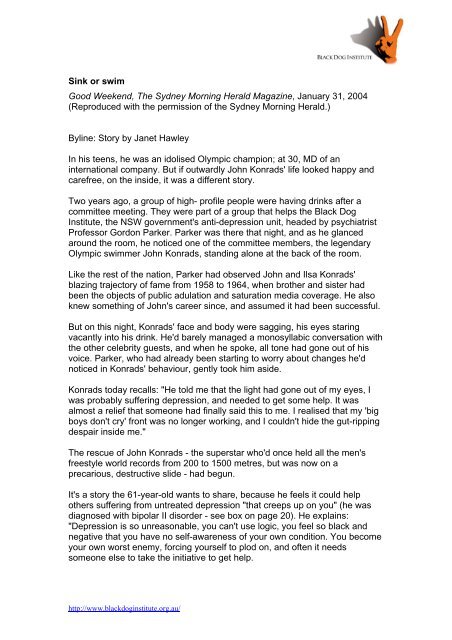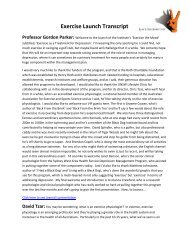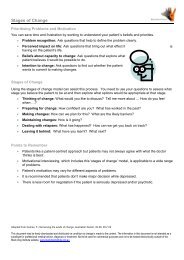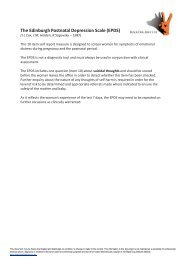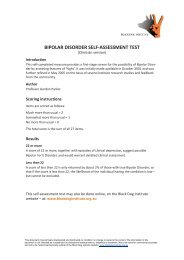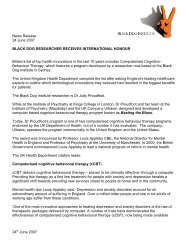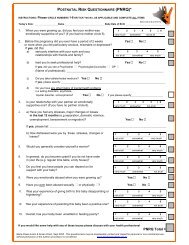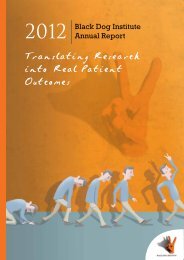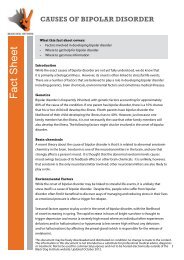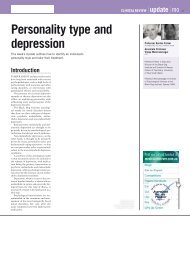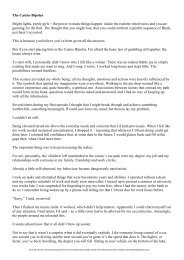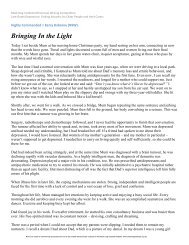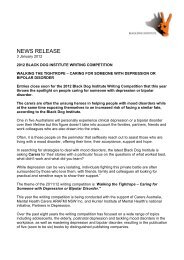Sink or swim - Black Dog Institute
Sink or swim - Black Dog Institute
Sink or swim - Black Dog Institute
Create successful ePaper yourself
Turn your PDF publications into a flip-book with our unique Google optimized e-Paper software.
<strong>Sink</strong> <strong>or</strong> <strong>swim</strong><br />
Good Weekend, The Sydney M<strong>or</strong>ning Herald Magazine, January 31, 2004<br />
(Reproduced with the permission of the Sydney M<strong>or</strong>ning Herald.)<br />
Byline: St<strong>or</strong>y by Janet Hawley<br />
In his teens, he was an idolised Olympic champion; at 30, MD of an<br />
international company. But if outwardly John Konrads' life looked happy and<br />
carefree, on the inside, it was a different st<strong>or</strong>y.<br />
Two years ago, a group of high- profile people were having drinks after a<br />
committee meeting. They were part of a group that helps the <strong>Black</strong> <strong>Dog</strong><br />
<strong>Institute</strong>, the NSW government's anti-depression unit, headed by psychiatrist<br />
Profess<strong>or</strong> G<strong>or</strong>don Parker. Parker was there that night, and as he glanced<br />
around the room, he noticed one of the committee members, the legendary<br />
Olympic <strong>swim</strong>mer John Konrads, standing alone at the back of the room.<br />
Like the rest of the nation, Parker had observed John and Ilsa Konrads'<br />
blazing traject<strong>or</strong>y of fame from 1958 to 1964, when brother and sister had<br />
been the objects of public adulation and saturation media coverage. He also<br />
knew something of John's career since, and assumed it had been successful.<br />
But on this night, Konrads' face and body were sagging, his eyes staring<br />
vacantly into his drink. He'd barely managed a monosyllabic conversation with<br />
the other celebrity guests, and when he spoke, all tone had gone out of his<br />
voice. Parker, who had already been starting to w<strong>or</strong>ry about changes he'd<br />
noticed in Konrads' behaviour, gently took him aside.<br />
Konrads today recalls: "He told me that the light had gone out of my eyes, I<br />
was probably suffering depression, and needed to get some help. It was<br />
almost a relief that someone had finally said this to me. I realised that my 'big<br />
boys don't cry' front was no longer w<strong>or</strong>king, and I couldn't hide the gut-ripping<br />
despair inside me."<br />
The rescue of John Konrads - the superstar who'd once held all the men's<br />
freestyle w<strong>or</strong>ld rec<strong>or</strong>ds from 200 to 1500 metres, but was now on a<br />
precarious, destructive slide - had begun.<br />
It's a st<strong>or</strong>y the 61-year-old wants to share, because he feels it could help<br />
others suffering from untreated depression "that creeps up on you" (he was<br />
diagnosed with bipolar II dis<strong>or</strong>der - see box on page 20). He explains:<br />
"Depression is so unreasonable, you can't use logic, you feel so black and<br />
negative that you have no self-awareness of your own condition. You become<br />
your own w<strong>or</strong>st enemy, f<strong>or</strong>cing yourself to plod on, and often it needs<br />
someone else to take the initiative to get help.<br />
http://www.blackdoginstitute.<strong>or</strong>g.au/
"The biggest relief is to learn that it's not your fault, and that a combination of<br />
medication, talking therapy, exercise and meditation can turn it around. When<br />
I started to feel well again, it was scary to look back and see what a pitiful<br />
state I'd reached."<br />
In January 1958, a 13-year-old girl called Ilsa Konrads stunned the nation<br />
when she broke two women's freestyle w<strong>or</strong>ld rec<strong>or</strong>ds. Two weeks later, her<br />
brother John, 15, broke two men's freestyle w<strong>or</strong>ld rec<strong>or</strong>ds.<br />
Australia immediately fell in love with the Konrads kids, and the media<br />
attention continued f<strong>or</strong> the next six years, as Ilsa set 12 individual w<strong>or</strong>ld<br />
rec<strong>or</strong>ds and John 24.<br />
Speaking from his Brisbane home, their f<strong>or</strong>mer coach, Don Talbot, says:<br />
"John and Ilsa were absolutely fawned on, doted on by everyone they<br />
encountered. If you think it's tough what Th<strong>or</strong>pie has to face up to today, it<br />
was twice as bad f<strong>or</strong> the Konrads kids back then, and they had no<br />
professional back-up."<br />
John admits: "I loved the publicity and attention, revelled in it, but Ilsa was a<br />
m<strong>or</strong>e shy, private person, who felt uncomf<strong>or</strong>table with media scrutiny, and<br />
then absolutely hated it." (Ilsa quit <strong>swim</strong>ming f<strong>or</strong>ever at 19, and beat the<br />
enemy by joining their ranks, becoming a journalist and going on to edit<br />
Vogue Living and Belle magazines. She now w<strong>or</strong>ks as a freelance publisher.)<br />
The Konrads st<strong>or</strong>yline was a dream f<strong>or</strong> the media. In 1949, John Konrads Snr,<br />
a dental technician, and his wife, Elsa, a dentist, had arrived in Australia on an<br />
immigrant ship, with children Eve, 9, John, 7, and Ilsa, 5, after fleeing Sovietcontrolled<br />
Latvia.<br />
They went to a migrant hostel in Wagga Wagga, an old RAAF base with a<br />
pool, where the Konrads kids learned to <strong>swim</strong>, John showing an uncanny<br />
natural turn of speed.<br />
The family moved to live in the back of a house in the Sydney suburb of<br />
Revesby, and 19-year-old Don Talbot, a teacher at their local primary school<br />
and an apprentice coach at Bankstown Baths, took John, aged 11, on the<br />
back of his mot<strong>or</strong>bike to <strong>swim</strong> a time trial.<br />
Ilsa explains: "I was the accidental <strong>swim</strong>mer - the brat little sister who said,<br />
'Johnny's doing <strong>swim</strong>ming and I want to, too!'"<br />
The juni<strong>or</strong> coach knew he'd "got lucky", quit teaching, and the trio's<br />
relationship snowballed.<br />
"Ilsa and I became like peas in a pod, and Don, our coach and ment<strong>or</strong>, was<br />
always there," says John. "Don collected us in his car at 5.45am, as our<br />
parents didn't have a car; Ilsa and I trained together, caught buses and trains<br />
to school, then back after school f<strong>or</strong> m<strong>or</strong>e training, then train and bus home."<br />
http://www.blackdoginstitute.<strong>or</strong>g.au/
Their training conditions sound primitive today. "Bankstown pool was a zoo!"<br />
sn<strong>or</strong>ts Talbot. There were no dedicated training lanes, so his squad had to<br />
fight through the jostling public crowded into the pool.<br />
"We were young thugs," Ilsa confesses. "Freestylers <strong>swim</strong>ming with clenched<br />
fists, backstrokers straight over the top of anyone, breaststrokers with vicious<br />
kicks to groins..."<br />
They w<strong>or</strong>e square-cut Speedos, but there were no goggles, no biodynamic<br />
analysis, no underwater cameras <strong>or</strong> computers scrutinising every stroke.<br />
Medically, "only heart rate and blood iron levels were checked, we took<br />
vitamin pills and were told to eat lots of protein, so Johnny and I ate lots of<br />
steak while the rest of the family ate God knows what," Ilsa recalls.<br />
As f<strong>or</strong> psychology: it consisted of the rote phrase repeated by back-slapping<br />
teachers, may<strong>or</strong>s, RSL club officials: "Now don't get a swelled head!"<br />
"Things like depression weren't ever talked about, we didn't know what they<br />
were," says Talbot.<br />
John says earnestly: "We were being trained to win, and I loved pushing<br />
myself through the pain barrier. I set unrealistically high expectations of<br />
myself, as I had such a strong competitive need to win. Winning made me feel<br />
superi<strong>or</strong>, it fed my ego. It's taken me decades to realise I'd set a trap f<strong>or</strong><br />
myself."<br />
Meanwhile, the Konrads parents dealt enterprisingly with the fact that their<br />
professional qualifications weren't recognised here. "They ran a low-cost<br />
black-market dental service from home," says John. "Mum, now 99, turned a<br />
big dining-room chair into her dentist's chair, she had a pedal-pump drill, and<br />
Dad made beautiful dentures.<br />
"Our parents were quietly supp<strong>or</strong>tive, never pushy; they wouldn't have known<br />
how to push."<br />
Culturally, his father never fully adapted to Australia. "The best job he could<br />
get was polishing glass in a glass fact<strong>or</strong>y. He loved opera, and played<br />
classical music constantly. He had a drinking problem, and I have a poignant<br />
mem<strong>or</strong>y from when I was 15, of finding him at 4am, slumped over a bottle and<br />
weeping, with opera playing."<br />
He died when John was 23, of a brain tumour and cirrhosis of the liver.<br />
It wasn't only at home that Konrads was exposed to excessive drinking. A lot<br />
of hard drinking used to go on at the big amateur meets. John was 16 and<br />
competing at the 1958 Commonwealth Games in Cardiff "when I learned that<br />
after the hard w<strong>or</strong>k of winning medals, you drank, not to celebrate, but to get<br />
disgustingly pissed, and the person most pissed was the most respected.<br />
Older athletes led the young ones into it, and I eagerly let myself be led<br />
http://www.blackdoginstitute.<strong>or</strong>g.au/
astray, drinking half a bottle of Vat 69. Partying and pillow fights got out of<br />
hand, some athletes trashed rooms."<br />
After winning one gold and two bronze at the 1960 Rome Olympics, Konrads<br />
relished both being a celebrity and having one drink too many. "I liked mixing<br />
with famous and influential people, I liked the good life. I'd get on a high, and<br />
the m<strong>or</strong>e I drank, the higher I'd go, and John's the life of the party again,<br />
playing the clown, the naughty boy, flirting.<br />
"It got in the way of my fitness, and maybe I would have been a greater<br />
<strong>swim</strong>mer and my career would have lasted longer if it hadn't."<br />
Konrads spoke to Good Weekend with such acute openness that Don Talbot,<br />
when told this, w<strong>or</strong>ried that the lad he'd coached from age 11 was being too<br />
harsh on himself.<br />
Talbot's gravelly voice became emotional and emphatic: "John's hardly the<br />
only one who got into trouble. His parents didn't have a clue how to deal with<br />
the pressures and subtleties of being an elite athlete. I had a whole squad of<br />
<strong>swim</strong>mers to look after.<br />
"John has always been an extremely capable and talented person, who<br />
wanted to push himself. He's a very likeable, generous and compassionate<br />
man. He was the most articulate and sociable of the <strong>swim</strong>mers of his time, but<br />
probably too handsome and too much of a party-goer f<strong>or</strong> his own good.<br />
"But remember, <strong>swim</strong>mers in John's day were unpaid amateurs who did it f<strong>or</strong><br />
the gl<strong>or</strong>y of sp<strong>or</strong>t and a pat on the back. Financially, they ended up with the<br />
arse out of their pants! They didn't have business managers, personal<br />
managers, psychologists, scientists, <strong>or</strong> any of the entourage of professional<br />
help that elite athletes get today. John only had me - a juni<strong>or</strong> coach, eight<br />
years older than he was."<br />
Talbot did a master's in psychology at age 45, because he came to realise<br />
how vital the psychological side is, both in the perf<strong>or</strong>mance of champions and<br />
in the transitional help they should be given when they retire. "Suddenly the<br />
dominant part of their life and identity ... the training routine, coach barking at<br />
them, the discipline, competing, being the centre of attention, the euph<strong>or</strong>ia of<br />
winning, cheering of the crowd ... it's all gone.<br />
"The crucial problem with fame is the higher you go, the m<strong>or</strong>e dangerous the<br />
fall.<br />
If you don't know how to handle fame <strong>or</strong> don't get the right help, then loss of<br />
fame can destroy you."<br />
If the amateurs of that era had been allowed to earn money from their talent,<br />
treat it as a career and hire personal managers, would Konrads and others<br />
http://www.blackdoginstitute.<strong>or</strong>g.au/
have been m<strong>or</strong>e disciplined and stayed <strong>swim</strong>ming longer "Undoubtedly yes,"<br />
say both Konrads and Talbot.<br />
But <strong>swim</strong>ming did open do<strong>or</strong>s, and Konrads was showered with invitations to<br />
dinner parties, glitterati events, TV chat shows. "I began to feel it was my<br />
natural milieu." Kerry Packer was a drinking mate, and Channel 9 called,<br />
saying: "We're going to make you a star." But his 1960 teen music program,<br />
The John Konrads Show, lasted only one season.<br />
At 19, Konrads was offered a sp<strong>or</strong>ts scholarship at the University of Southern<br />
Calif<strong>or</strong>nia, began a business studies degree and completed 2 1/2 years. But<br />
away from Talbot's steadying influence, Calif<strong>or</strong>nian girls and Co<strong>or</strong>s beer<br />
occupied too much of his time. He returned to Australia to try f<strong>or</strong> the '64 Tokyo<br />
Olympics, just scraped into the relay team, swam only in the heats, and after<br />
Tokyo retired.<br />
The Calif<strong>or</strong>nian university, requiring wins, halved his scholarship, so he<br />
remained in Sydney. "Suddenly," he says, "I was a has-been - 'Konrads is<br />
washed up at 21' - and I felt bloody depressed."<br />
Ilsa, who had failed to make the Tokyo team, also retired. "I was so weary of<br />
slogging up and down the pool, it was a huge relief to quit. I was thrilled, free<br />
at last! I never missed <strong>swim</strong>ming - what's to miss I never needed to go<br />
through a grieving process, I just got on with an interesting new life. In truth, I<br />
think Johnny missed the adulation, not the <strong>swim</strong>ming."<br />
Another do<strong>or</strong> opened f<strong>or</strong> Konrads when tennis champ Lew Hoad mentioned<br />
that a Frenchman he knew was opening a ritzy country club n<strong>or</strong>th of Paris,<br />
and wanted an Olympian as direct<strong>or</strong> of <strong>swim</strong>ming.<br />
Konrads leapt at it. "The French love success, and once again I was a bloody<br />
hero. It felt fantastic." He lived in a luxurious environment, teaching the<br />
wealthy to <strong>swim</strong>. But instead of being seduced by the rich and glam<strong>or</strong>ous<br />
women who chased after the golden boy, he fell passionately in love with a<br />
non-dazzled Dutch au pair, and married her in the first year. She was to prove<br />
the rock in his life.<br />
Over lunch in the courtyard of their Sydney apartment, Mikki Konrads recalls<br />
how, despite the exciting life they lived f<strong>or</strong> the next five years, invited to stay in<br />
chateaus and sail on luxury yachts, her husband began to feel empty. "John<br />
desperately wanted to prove that he could be successful in something other<br />
than <strong>swim</strong>ming," says Mikki, "not so much f<strong>or</strong> the money, but f<strong>or</strong> the kudos,<br />
the recognition."<br />
"I didn't want to grow into one of those poolside old men with lizard skin,<br />
cracked feet, a stopwatch on a fat belly and a whistle in my mouth," mutters<br />
Konrads.<br />
http://www.blackdoginstitute.<strong>or</strong>g.au/
Mikki happened to play tennis with the vice-president of cosmetics company<br />
L'Oréal, who happened to be looking f<strong>or</strong> someone to manage their business in<br />
Australia. Konrads joined L'Oréal in Paris, and after a year's training was sent<br />
in 1973 to Melbourne, aged 30, as managing direct<strong>or</strong> of L'Oréal Australia and<br />
New Zealand.<br />
"With hindsight, I was over-promoted," he now frankly admits, "but of course<br />
my brash ego wouldn't acknowledge that to myself at the time. I was an MD in<br />
an imp<strong>or</strong>tant international company, so I was successful, wasn't I I didn't<br />
need the deep and meaningfuls with anyone. Another trap I set myself."<br />
Moving to Melbourne, Konrads turned his back on <strong>swim</strong>ming f<strong>or</strong> the next 17<br />
years, took up tennis, golf, windsurfing. He wanted the things he didn't have<br />
as a child, and "emulated what successful people did". He prided himself on<br />
being a good provider. "I had a lovely big home in Brighton, a beautiful nonw<strong>or</strong>king<br />
wife, three kids at private schools. We lived well, entertained well,<br />
and kept up with the Joneses."<br />
Until the Melbourne move, the highs of Konrads' bipolar dis<strong>or</strong>der (see box)<br />
had predominated, and were written off as just part of his exuberant<br />
personality - "John's over the top again". Any lows he could shake off.<br />
Now came a pattern of severe lows.<br />
"Every springtime, come September, I felt I couldn't cope with the<br />
complexities and pressures of business any m<strong>or</strong>e - I kept going outside and<br />
walking round the block. This gloomy low lasted till Christmas, when the<br />
festive season highs took over."<br />
L'Oréal was satisfied with his perf<strong>or</strong>mance, indeed kept him there f<strong>or</strong> 14<br />
years. When Konrads told a visiting L'Oréal executive that he w<strong>or</strong>ried he was<br />
not on top of the job, the executive responded that maybe he'd been at his<br />
most successful when he had a coach, but now his coach - that is, his<br />
c<strong>or</strong>p<strong>or</strong>ate bosses - were thousands of kilometres away in Paris.<br />
Konrads felt insulted. He was an adult now and didn't need a coach; he could<br />
set his own targets f<strong>or</strong> his personal best, solve his own problems. Big boys<br />
don't whinge to the coach.<br />
The job was busy. He travelled 90 days a year, attended international sales<br />
conferences in exotic locations, was great at PR, marketing and people skills,<br />
not too good on controlling costs, loved a lot of it, everyone loved him. But<br />
gnawing away inside were uncertainties: was he really up to being a winner in<br />
a field outside <strong>swim</strong>ming Was he hired because of his business skills <strong>or</strong> his<br />
charisma<br />
The m<strong>or</strong>e Konrads lashed himself, the m<strong>or</strong>e his confidence slipped and mood<br />
swings grew. "I drank heavily and was too uninhibited at convention parties,<br />
losing some of my auth<strong>or</strong>ity," he feels. "I realised effective CEOs did seek out<br />
coaches, i.e., ment<strong>or</strong>s, to clarify ideas and get feedback, so I felt I'd failed.<br />
http://www.blackdoginstitute.<strong>or</strong>g.au/
"I felt my perf<strong>or</strong>mance had plateaued, and the company indicated I'd probably<br />
gone stale, and offered to move me back to Paris." But he felt they were just<br />
being kind to him, so he resigned and took a golden handshake.<br />
Konrads could have easily glossed over all of the above and, like a lot of other<br />
departed CEOs, spin-doct<strong>or</strong>ed it to make it sound wonderful, but after a year<br />
in therapy, he's almost painfully honest about everything.<br />
He blew his super and the golden handshake to buy a holiday house in<br />
P<strong>or</strong>tsea. "We lived like kings, beyond our means," says Mikki. "I kept saying to<br />
John, 'This is ridiculous, where is all this money coming from' and he'd gaily<br />
reply, 'Darling, don't w<strong>or</strong>ry.'"<br />
Do<strong>or</strong>s opened again: Sir Peter Abeles made him marketing manager of<br />
Ansett; later he became head of the Melbourne Maj<strong>or</strong> Events Company. Still<br />
he felt he wasn't perf<strong>or</strong>ming like an Olympic champion, wasn't thrashing the<br />
competition so he could bask in the applause.<br />
In the late '90s he sold up in Melbourne and moved the family to Sydney, but<br />
hit the real estate boom and couldn't aff<strong>or</strong>d a house, so began renting.<br />
Warming to the 2000 Olympics hype, he spent $16,000 on tickets, and also<br />
began w<strong>or</strong>king out and <strong>swim</strong>ming laps again at the elite Tattersalls Club.<br />
Invited by one of his fellow lappers to join the <strong>Black</strong> <strong>Dog</strong> committee, he went<br />
along to meetings, never thinking he himself might be depressed. "Who, me<br />
I'd always met every challenge, toughed out every difficulty, and was proud of<br />
it."<br />
About that time, he joined a cons<strong>or</strong>tium bidding f<strong>or</strong> the lease of the new inner-<br />
Sydney Cook + Phillip Park Aquatic Centre, won, and now handles marketing,<br />
customers and runs a personal <strong>swim</strong> clinic, while his business partner<br />
handles finance and administration.<br />
The aquatic centre had a good first year, so Konrads took Mikki holidaying in<br />
Europe, in 2001. They were staying with her family in Amsterdam when<br />
Konrads woke in the middle of the night in physical agony.<br />
"I was used to bearing great pain as a <strong>swim</strong>mer, but this was w<strong>or</strong>se than any<br />
pain I'd experienced; as if someone was rubbing all my nerve endings<br />
together in my lower stomach.<br />
"I was gripped by black despair, and felt that everything I'd done since I<br />
stopped <strong>swim</strong>ming was a failure. I was 59, and I'd thrown my life away. I<br />
always had this high expectation of myself, that I would end up a successful<br />
and wealthy man. I used to own two houses, but now I didn't even own one,<br />
and was renting. I berated myself that I had no money put aside f<strong>or</strong><br />
retirement.<br />
http://www.blackdoginstitute.<strong>or</strong>g.au/
"I used to be the hero of my family, and my wife's family, but now all her<br />
siblings were m<strong>or</strong>e successful and wealthier than I was."<br />
He'd dealt with lows bef<strong>or</strong>e, and bounced back, but the ghastly pain and<br />
negative thinking continued. F<strong>or</strong> weeks he did his tough-it-out routine, pushing<br />
himself through w<strong>or</strong>k appointments, and self-medicating with alcohol, hitting<br />
20 drinks daily, and cigarettes.<br />
Mikki tried to stop him drinking and smoking, and to break through his gloom,<br />
but was powerless. He snapped at her to stop nagging, they were fighting all<br />
the time and lost the ability to communicate. "I was so used to putting on a<br />
front, I couldn't explain to her what was wrong with me. I asked Mikki f<strong>or</strong> m<strong>or</strong>e<br />
supp<strong>or</strong>t, and she responded by making sure I had m<strong>or</strong>e crispy clean shirts,<br />
the dinner was nicer, the flo<strong>or</strong>s cleaner. I'd go to dinners f<strong>or</strong> Mikki's sake, but<br />
felt so m<strong>or</strong>ose I'd isolate myself by staring at my plate, barely talking."<br />
His mood swings to highs continued, but the highs soared higher. "I'd be m<strong>or</strong>e<br />
the life of the party than ever, flirt outrageously, take naive risks, jump into the<br />
spa in the nuddy, embarrass and upset my wife."<br />
Mikki adds: "I'd say, 'John, we're going home, you're drunk,' and he'd yell, 'No,<br />
darling, we're just having fun!'"<br />
Being diagnosed with bipolar II, after that meeting with G<strong>or</strong>don Parker, was a<br />
blessed circuit-breaker, and led to vast all-round improvements in Konrads'<br />
life, his w<strong>or</strong>k and his relationship with his wife.<br />
With treatment, he says he no longer has downers, the constant negativity<br />
has gone. "Some days I might be reflective and sense myself going down, but<br />
I can feel this platf<strong>or</strong>m catching me. Where I used to sink 10 fathoms, I now<br />
only sink one <strong>or</strong> two. I still get highs, but I'm now m<strong>or</strong>e self-aware, and they<br />
are enjoyable highs, not out-of-control ones."<br />
Along with the medication, he spent a year seeing a psychologist, and had<br />
joint counselling with Mikki. Finally he came to terms with the fact that post<strong>swim</strong>ming,<br />
he'd never reach the same euph<strong>or</strong>ic highs in real life, and he<br />
should stop comparing his perf<strong>or</strong>mance in and out of the pool, and judging<br />
himself a failure. Says Konrads: "It helped me change my values, to<br />
appreciate m<strong>or</strong>e what I've got - a wonderful wife and family - and to see that<br />
my own achievements are quite good enough. The biggest thing I've learned<br />
is not to have ambitions beyond plausible reality. I've had to adjust my whole<br />
psychology from always wanting to win, to not needing to win.<br />
"I no longer value success in terms of money and fame. I still want to be<br />
productive and industrious, but realise health, happiness and wellbeing matter<br />
m<strong>or</strong>e."<br />
In the several days I spent with Konrads, it was apparent that he hadn't lost<br />
the taste f<strong>or</strong> rubbing shoulders with the successful and famous. "True," he<br />
http://www.blackdoginstitute.<strong>or</strong>g.au/
agrees, "but my attitude is different now. It's not about feeding my ego. Now I<br />
regard them as ment<strong>or</strong>s, and hope some of their wisdom will rub off on me."<br />
He's given up drinking, but is finding it a struggle to stop smoking. "He wants<br />
to be a good person, disciplined and strong again - because he is," stresses<br />
Mikki.<br />
I wanted to see Konrads <strong>swim</strong>ming, so joined in one of his clinics. He still has<br />
a <strong>swim</strong>mer's physique, and <strong>swim</strong>s the way he walks, with muscular grace,<br />
back as broad as a table, slim hips, powerful arms and big hands.<br />
"Technically my big hands are m<strong>or</strong>e useful to power myself through the water<br />
than Th<strong>or</strong>pie's big feet that the media go on about - kick is only 5 per cent of<br />
<strong>swim</strong> speed," he reckons, smiling.<br />
Today, even wearing goggles, the light is back in his eyes.<br />
Highs and lows<br />
* People have a genetic propensity towards bipolar mood dis<strong>or</strong>der, and<br />
environmental fact<strong>or</strong>s trigger it, says Profess<strong>or</strong> G<strong>or</strong>don Parker. The figure<br />
commonly given f<strong>or</strong> lifetime rates is 1 to 2 per cent of the population, about<br />
half with bipolar I and half with bipolar II. "But because bipolar II is less clear<br />
cut," says Parker, "it often takes 12 to 15 years from onset to diagnosis."<br />
People with both f<strong>or</strong>ms suffer mood swings from lows to highs.<br />
The lows - what Winston Churchill called "the black dog" - are similar.<br />
Depression saps energy and often the will to live, and everything appears<br />
negative and hopeless.<br />
The highs, however, are different. "In bipolar I," says Parker, "f<strong>or</strong>merly called<br />
manic depression, highs last longer and people go psychotic, hallucinate,<br />
don't sleep, libido rages, they think they have supernatural powers - that they<br />
are Christ <strong>or</strong> can <strong>swim</strong> to America.<br />
"People on bipolar II highs don't become psychotic <strong>or</strong> hallucinate. They get<br />
racy, pacy, talkative, uninhibited. Creativity and w<strong>or</strong>k output may rise, but<br />
libido and need f<strong>or</strong> alcohol also rise. They can be very funny and infectious to<br />
a certain level and appear in a perfect euph<strong>or</strong>ic state, then get irritable,<br />
scratchy, and make rash decisions like spending too much money, <strong>or</strong> take<br />
risks and get into terrible situations.<br />
"Many creative people and high achievers have bipolar I <strong>or</strong> II, and say they<br />
ride their highs to success, even use lows creatively, and don't want<br />
treatment. But in others, the dis<strong>or</strong>der gets out of hand, and treatment can<br />
greatly improve their quality of life."<br />
http://www.blackdoginstitute.<strong>or</strong>g.au/
F<strong>or</strong> inf<strong>or</strong>mation on all f<strong>or</strong>ms of depression, contact the <strong>Black</strong> <strong>Dog</strong> <strong>Institute</strong>,<br />
(02) 9382 4523, <strong>or</strong> Beyond Blue, (03) 9810 6100.<br />
Caption: SEVEN ILLUS: Going the distance: (insets, clockwise from left) the<br />
Konrads family at home in the late '50s; John, at right, with coach Don Talbot,<br />
sister Ilsa and fellow lapper Alan Kable in 1957, the year bef<strong>or</strong>e his first w<strong>or</strong>ld<br />
rec<strong>or</strong>d; with second placegetter Murray Rose and US bronze medallist<br />
Ge<strong>or</strong>ge Breen after the 1500 metres freestyle in Rome; as MD of L'Oréal's<br />
Australian operation. fairfax photo library (5); jennifer soo<br />
"I couldn't explain what was wrong with me. I asked Mikki f<strong>or</strong> m<strong>or</strong>e supp<strong>or</strong>t,<br />
and she responded by making sure I had m<strong>or</strong>e crispy clean shirts, the dinner<br />
was nicer, the flo<strong>or</strong>s cleaner": John and Mikki Konrads at home in Sydney.<br />
jennifer soo<br />
------------------------------<br />
Publication: Sydney M<strong>or</strong>ning Herald<br />
Publication date: 31-1-2004<br />
Edition: Late<br />
Page no: 18<br />
Section: Good Weekend<br />
Length: 4163<br />
------------------------------<br />
http://www.blackdoginstitute.<strong>or</strong>g.au/


